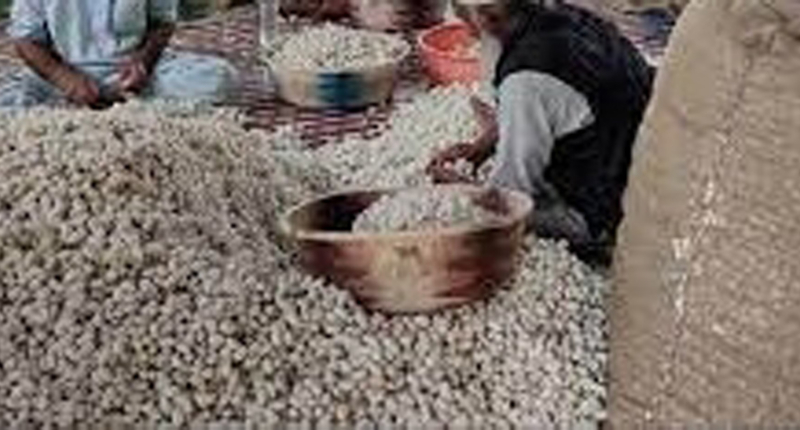The Jammu and Kashmir government is working towards reviving and developing the sericulture sector in the UT by training farmers in using modern technology, expanding mulberry plantations, promoting green wealth, and providing marketing support to cocoon growers. The Central Silk Board has set up the Central Sericulture Research and Training Institute (CSR & TI) at Pampore, Srinagar, to cater to the research, training, and extension needs of J&K. The institute has developed High Yielding Silkworm hybrids and improved mulberry varieties to increase farmers’ income through sericulture. The Central Silk Board is promoting bivoltine production programs, and technological interventions have improved the average yield of bivoltine cocoons. The Silk Samagra Yojana, launched in 2017-18, has made sericulture sustainable by supporting the country’s and J&K’s silk industry in an integrated manner. Under Silk Samagra Phase-I, about 900 silkworm rearers benefited directly, and under Phase-II, around 27,000 families involved in sericulture in the UT are expected to benefit.
Jammu and Kashmir to Improve Silk Production through Modern Technology
Jammu and Kashmir’s government announced plans to enhance silk production in the union territory by training farmers to use modern technology. Under a multi-pronged strategy to revive and develop the sericulture sector, cocoon growers will receive skill development training, technological interventions, and infrastructure support. The J&K government aims to increase leaf availability for rearers by expanding mulberry plantations, promoting green wealth, and marketing support to cocoon growers.
Lt. Governor Manoj Sinha expressed his commitment to improve the lives of farmers associated with silk production while safeguarding the age-old skills being transferred from generation to generation. The government also aims to preserve and promote the indigenous craft legacy of J&K across the globe. By adopting the latest technological advancements in the silk industry, the government aims to reduce dependence on imported silk. To achieve this objective, a center for research and development, training, transfer of technology, and IT intervention has been set up at Kashmir’s Pampore.
To educate silkworm rearers about the latest technology and practice for silkworm rearing, the Department of Sericulture, Rajouri, Mulberry Circle Lamberi recently organized Kissan Ghosti/Scientific interaction under ATMA program. Farmers were briefed about various projects being implemented under Holistic Agriculture Development Programme. These initiatives have yielded positive results, as Kundan Lal, a progressive farmer of Lamberi Rajouri, earned Rs 91,666.50 in 20 to 25 days by selling 87.6 kg dry crop. Similarly, Tilak Raj of Lamberi Village of Rajouri has earned Rs 1,32,356 in 20 to 25 days by selling 131.350 kg of silk.
The government’s futuristic roadmap for holistic growth of agriculture and allied sectors will help in ensuring product quality and quantity, besides raising global demand. The Forest and Sericulture Departments are jointly working towards achieving J&K’s Green Mission to enrich green wealth and ensure marketing support to cocoon growers in selling their produce in their vicinity. The government’s emphasis on modern technology, skill development training, and infrastructure support will transform the sericulture industry in J&K, reduce dependence on imported silk, and increase silk production in the union territory.
Central Silk Board Boosts Sericulture in Jammu & Kashmir
The Central Silk Board (CSB) established the Central Sericulture Research and Training Institute (CSR & TI) at Pampore, Srinagar, in 1994 to cater to the research, training, and extension needs of Jammu & Kashmir. The institute is actively involved in research and development, and human resource development through its network of two Regional Sericulture Research Stations (RSRS) and 8 Research Extension Centers.
CSR and TI Pampore has developed High Yielding Silkworm hybrids and improved mulberry varieties to increase the income of farmers through sericulture. The Central Silk Board is promoting bivoltine production programs by extending technical support through six clusters (including two mega clusters) and state-of-the-art soil testing facilities. Due to the continuous efforts of the Institute and technological interventions, the average yield of bivoltine cocoons has significantly improved.
The Silk Samagra Yojana, launched in 2017-18 under the guidance of the PM, has proved to be a game-changer in making sericulture sustainable by supporting the country’s and J&K’s silk industry in an integrated manner. Under Silk Samagra Phase-I, about 900 silkworm rearers benefited directly, with the establishment of about 618 rearing houses. In addition, the Central Silk Board has allocated Rs 35 crore for J&K under Silk Samagra Phase-II, benefiting around 27,000 families involved in sericulture in the UT.
Don’t miss interesting posts on Famousbio










